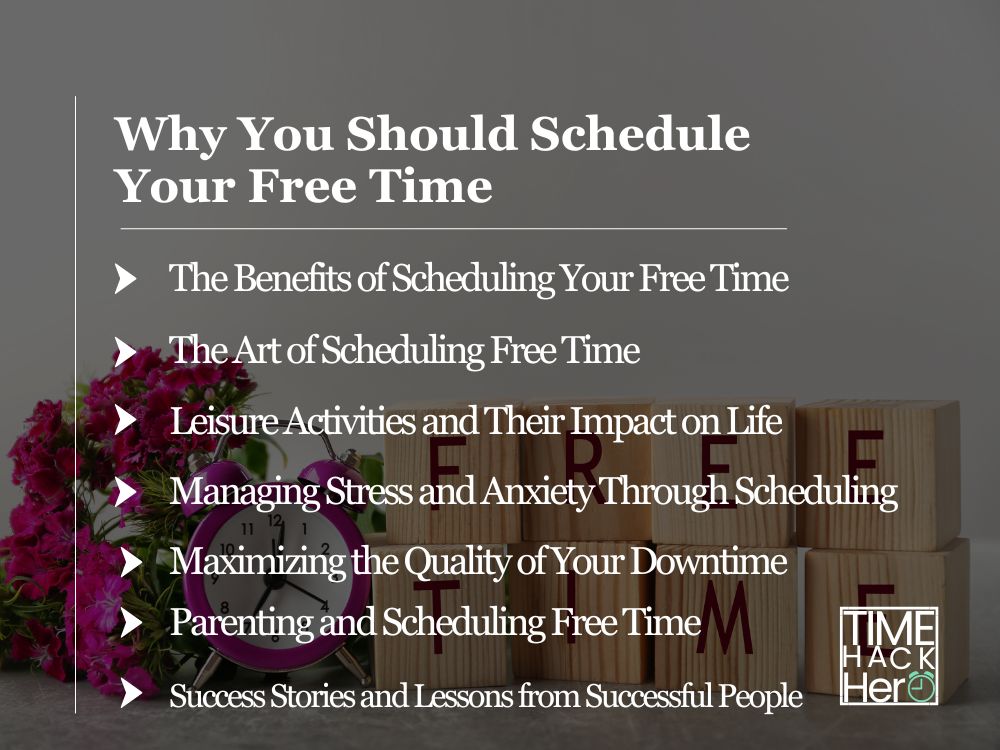In today’s fast-paced world, it’s easy to overlook the importance of carving out time for leisure and relaxation. With work, family commitments, and countless other responsibilities, many people struggle to find any downtime at all. But scheduling free time can do wonders for your overall health, well-being, and productivity. By consciously setting aside moments for relaxation and personal fulfillment, you can avoid the pitfalls of burnout and achieve a healthier, more balanced lifestyle.
Among the many benefits of scheduling free time are reduced stress and anxiety, improved mood, and increased alertness and energy. By engaging in activities such as meditation, exercise, or even just simple recreational hobbies, you can maximize the positive impact of your free time on your mental and physical well-being. Another key advantage is that you’ll be actively protecting your leisure time from being overtaken by additional work or other obligations.
To get the most out of your scheduled free time, it’s essential to be thoughtful and deliberate in your approach. Assess your current schedule, identify areas of opportunity for growth or change, and prioritize activities that align with your personal values and passions. By doing so, you’ll not only be investing in yourself but also paving the way for increased success and satisfaction in all facets of your life.
Table of Contents
The Benefits of Scheduling Your Free Time
Improved Productivity
Scheduling your free time can actually lead to increased productivity. By setting aside dedicated time for leisure activities, you encourage yourself to complete tasks efficiently and within the allotted time. This helps prevent work from spilling into your personal life, maintaining a healthy work-life balance and preventing burnout. In addition, taking breaks to engage in leisure activities can boost cognition, alertness, and energy, further contributing to productivity.
Higher Happiness Levels
When free time is scheduled, it allows you to focus on activities that genuinely make you happy. This can lead to higher happiness levels and improved mood. Moreover, regularly engaging in pleasurable activities alleviates stress and fosters a more positive mindset. Scheduled leisure time also helps protect your personal time from being hijacked by work or other obligations, ensuring that you give yourself the space to indulge in your favorite pastimes.
Enhanced Creativity
Allocating specific time for leisure can also spark creativity. Engaging in various activities outside your work helps broaden your perspectives, discover new interests and learn new skills. This variety can stimulate your creative thinking and problem-solving abilities. Furthermore, taking breaks from work and spending time on hobbies provides an opportunity to subconsciously process work-related challenges, which can lead to innovative solutions.
Better Health and Well-Being
Scheduling free time is essential for maintaining your overall health and well-being. Participating in recreational activities provides a well-deserved break, allowing your mind and body to rest and recover from daily stressors. Engaging in leisure activities like exercise, meditation, or spending time in nature can improve your physical and mental health, reduce stress and anxiety, and lead to an overall sense of well-being. As a result, you’ll likely take fewer sick days and feel more energized and ready to tackle the demands of daily life.
The Art of Scheduling Free Time
Strategies for Prioritizing Activities
When it comes to scheduling free time, it’s essential to prioritize activities based on their importance and value in your life. Start by making a list of activities you enjoy or need to accomplish during your free time. Then, rank them according to their importance to your well-being, personal growth, or social life.
Some strategies for prioritization include:
- Identifying which activities contribute to your long-term goals
- Allocating time to activities that provide relaxation or stress relief
- Considering the needs of your friends and family when scheduling social activities
Keeping a Calendar
A calendar is a crucial tool in effectively scheduling your free time. Whether it’s a physical calendar, a digital one, or a combination of both, keeping track of your commitments and leisure activities helps maintain a healthy work-life balance.
Some tips for managing a calendar include:
- Scheduling blocks of time for your most valued free-time activities
- Coloring or categorizing events and appointments based on their nature (e.g., work, personal, social)
- Regularly revisiting and updating your calendar to stay on track with your free time goals
Finding Balance Between Structure and Flexibility
While having a structured schedule can improve productivity and predictability, it’s also essential to maintain a degree of flexibility in your free time. A balance between structure and flexibility promotes spontaneity and prevents feelings of being overwhelmed or constrained by too many commitments.
Some suggestions for achieving this balance include:
- Allowing buffer time between scheduled activities for unexpected events or opportunities
- Being open to rescheduling when necessary to accommodate new interests or priorities
- Recognizing that it’s okay not to have every minute of your free time planned in advance
By utilizing these techniques, you can create a more meaningful and enjoyable experience during your free time while staying organized and focused on your priorities.
Leisure Activities and Their Impact on Life
Hobbies and Interests
Engaging in leisure activities such as hobbies and interests can significantly improve one’s mental health and overall well-being. Pursuing hobbies allows people to utilize their skills and passions in a engaging and fulfilling manner. By allocating scheduled time for these activities, individuals can ensure they maintain a healthy work-life balance, reduce stress, and enhance creativity.
Exercise and Outdoor Activities
Physical exercise and outdoor activities are essential components of a balanced lifestyle. Scheduling time for exercise not only promotes physical well-being, but also contributes to mental health by reducing stress and anxiety, boosting cognitive function, and increasing energy levels. Outdoor activities, such as hiking, biking, or team sports, offer the additional benefits of connecting with nature and fostering a sense of camaraderie among participants.
Volunteering and Community Involvement
Allocating some leisure time for volunteering and community involvement can lead to personal growth and a greater sense of purpose. By engaging in these activities, people have the opportunity to:
- Develop new skills and knowledge
- Expand their social circles
- Foster a sense of achievement
- Give back to their community
Volunteering enables individuals to contribute to the greater good while simultaneously enhancing their well-being.
Fostering Relationships
Building and nurturing relationships is crucial for long-term emotional health and happiness. Scheduling leisure time for social activities, such as gatherings with friends and family or participating in clubs and community events, can enhance interpersonal connections and provide emotional support networks that contribute to overall well-being.
Managing Stress and Anxiety Through Scheduling
Reducing Time Stress and Pressure
Scheduling your free time can significantly reduce the stress and pressure associated with time management. By blocking off designated periods for rest and relaxation, you allow yourself the opportunity to step back and recharge. This can lead to better focus and productivity, as well as decreased overall stress levels.
- Plan regular breaks from work or other obligations
- Set aside specific times for hobbies or leisure activities
- Prioritize time for self-care, such as exercise or meditation
Disconnecting from Work
Another important aspect of scheduling free time is the ability to disconnect from work. In today’s fast-paced, always-connected world, it can be challenging to find time to truly unwind and separate from work-related stressors. By scheduling time away from work, you give yourself permission to disconnect and create a mental separation between your professional and personal life.
- Establish boundaries and limit work-related communication during off-hours
- Cultivate hobbies and interests outside of your professional responsibilities
- Consider setting up a designated space for relaxation, free from work-related distractions
Developing a Healthy Work-Life Balance
A healthy work-life balance is essential for maintaining good mental health and overall well-being. By scheduling your free time, you demonstrate a commitment to maintaining this balance, prioritizing both personal and professional obligations. Incorporating time for relaxation and enjoyment can lead to reduced stress and anxiety, increased job satisfaction, and better relationships with friends and family.
- Strive for consistency in your schedule, making time for personal responsibilities and self-care
- Be realistic and flexible with your expectations, adjusting your schedule as needed
- Communicate your prioritization of work-life balance with friends, family, and colleagues
Maximizing the Quality of Your Downtime
The Role of Sleep and Rest
A key aspect of maximizing the quality of your downtime is prioritizing sleep and rest. Inadequate sleep can lead to decreased cognitive function, impaired memory, and reduced emotional regulation. To get the most out of your free time, it is essential to establish healthy sleep habits, such as:
- Maintaining a consistent sleep schedule
- Creating a relaxing sleep environment
- Limiting exposure to screens before bedtime
- Incorporating relaxation techniques, like deep breathing or meditation, before sleeping
Techniques for Recharging and Decompressing
To effectively recharge and decompress during your downtime, it is vital to engage in enjoyable activities that allow you to disengage from work and other daily stressors. Some techniques to consider include:
- Meditation or mindfulness practices
- Engaging in physical activities, such as walking or yoga
- Picking up a hobby, like painting or playing an instrument
- Spending time in nature, whether it be hiking, gardening, or merely relaxing outdoors
Planning for Unstructured Time
While scheduling planned activities can be beneficial, it is also essential to allocate time for unstructured, spontaneous experiences. Allowing for flexibility gives you the opportunity to enjoy your free time without the constraints of a rigid schedule. To achieve a balance of planned and unplanned downtime, consider:
- Setting aside blocks of open time in your calendar
- Embracing spontaneity and being open to unexpected opportunities
- Recognizing the value in downtime and the importance of allowing for self-exploration and relaxation
By incorporating these approaches, you can effectively maximize the quality of your downtime, ensuring you make the most of your scheduled free time.
Parenting and Scheduling Free Time
Creating Quality Time with Children
When it comes to parenting, ensuring that children have enough free time is crucial. As they enter puberty and adolescence, a balanced mix of scheduled activities and downtime allows children to develop social skills, explore their interests, and learn about themselves. Scheduling free time and family activities also serves as a great opportunity to strengthen connections and create lasting memories with your children.
Managing Parental Responsibilities
Effective time management is essential for parents to manage various responsibilities such as work, household chores, and children’s activities. By proactively planning and scheduling free time, parents can have a clearer view of their commitments, and make sure that time is divided equally among different tasks. This can also provide a perfect opportunity to engage children in age-appropriate household duties, teaching them valuable life skills in the process.
Finding Time for Self-Care and Personal Interests
It’s important for parents to carve out time for self-care and personal interests in their busy schedules. This may involve designating 15 minutes in the evening, for instance, as “me time” to engage in activities that help recharge and unwind. Scheduling regular breaks can result in several benefits, such as reduced stress, increased productivity, and an overall improvement in mood. Prioritizing self-care also teaches children to value personal well-being, setting them up for a healthier relationship with their own work-life balance in the future.
Success Stories and Lessons from Successful People
Laura Vanderkam: The Importance of Scheduled Free Time
Laura Vanderkam, a time management expert, has studied how busy people allocate their time. She discovered that many individuals overestimate their commitments while underestimating the time they have for themselves. By scheduling free time, they can reclaim that time and use it for their wellbeing, health, and personal growth.
- Scheduled free time can lead to reduced stress, increased alertness, and improved cognition.
- By following Laura Vanderkam’s advice, individuals can create more time to prioritize what matters most to them.
Examples from Highly Productive Individuals
Successful people often use the following strategies to make effective use of their free time:
- Exercise: Many successful individuals integrate physical activity into their daily routines, which benefits both their physical and mental health .
- Time management skills: Effective time management allows individuals to structure, protect, and adjust their time in response to changing conditions. This skillset has proven essential for many successful individuals.
- Consistent routines: Successful people often create routines that help them get the most out of their day. A valuable daily habit includes asking themselves what would be the most productive and efficient use of their time
| Strategy | Benefits |
|---|---|
| Scheduled Free Time | Reduced stress, improved cognition |
| Exercise | Physical and mental wellbeing |
| Time Management Skills | Adapting to changing conditions |
| Consistent Routines | Efficient use of time |









